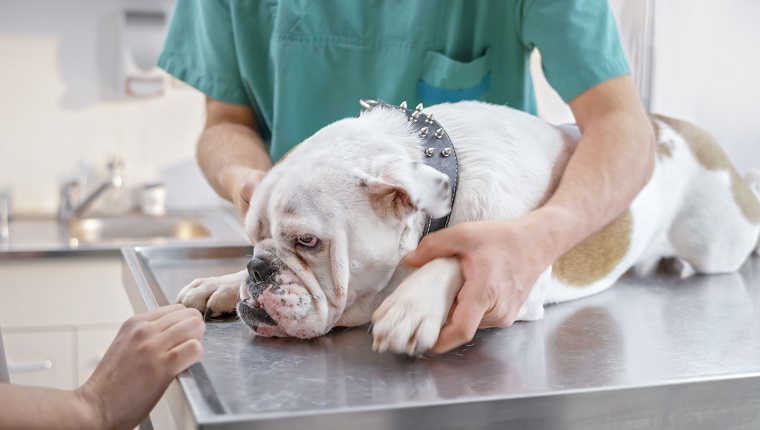Intestinal blockage in dogs is a medical condition that happens when a dog’s intestines become obstructed, which can prevent food and liquid from properly passing through the intestine.
In turn, the dog won’t be able to receive the amount of nutrients and water they need and dehydration can set in. It can also potentially cause issues such as a bowel rupture.
The blockage is often caused by a dog eating a foreign object, such as a toy or bone.
If you see signs that your dog might be suffering from digestive issues, then you must consult your veterinarian for a proper diagnosis and advice. Here’s what you should know about the symptoms, causes, and treatments of intestinal blockage in dogs.
Symptoms Of Intestinal Blockage In Dogs
Intestinal blockage in dogs can bring on a range of symptoms. Some of the most common symptoms include:
- Vomiting
- Diarrhea
- Losing weight
- Acting weak and lethargic
- Pain in the abdominal area
- Straining while trying to poop
- Loss of appetite
Causes Of Intestinal Blockage In Dogs

The cause of intestinal blockage in dogs is often a dog eating some sort of foreign object. Some of the objects that most frequently cause a blockage include:
- Bones
- Toys
- Rocks
- String, ribbons, and yarn
- Fruit pits
- Small clothing (such as socks)
Some of the other potential causes include:
- Intestinal tumors
- Hernias
- Inflamed intestines
- Strictures
- Parasites in the intestine
Veterinary Treatments
First of all, if you actually see your dog eating a foreign object, call your veterinarian straight away. They can advise you on the next steps to take.
If you bring your dog to your vet suspecting that they are suffering from intestinal blockage, your vet will want to carry out a full physical examination and also pay particular attention to the abdominal area.
In many cases, vets will use an X-ray to confirm a diagnosis, and ultrasounds can also be an option. Additionally, the vet can carry out blood and urine tests to make sure that your dog is not suffering from dehydration.
In some cases, it is actually possible for a dog to pass the object when they defecate. But more serious cases will require a surgical removal of the object.
The vet will place your dog under anesthesia to carry out this procedure, and your dog might also need to receive intravenous fluids to make sure that they stay properly hydrated.
While recovering, your dog might need to stay in the hospital for a couple of days to make sure that they maintain proper hydration. While at home, your dog will need a period of rest and relaxation, usually for a couple of weeks.
Has your dog ever had an intestinal blockage? What caused it? Tell us all about it in the comments below.





